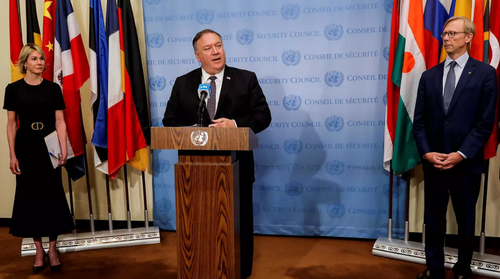
US Secretary of State, Mike Pompeo (middle) speaks in a press conference after the UN Security Council meeting on international sanctions against Iran, August 20, 2020, at UN headquarters, New York, USA. (Photo: Reuters)
|
US Secretary of State Mike Pompeo last week submitted to the UN Security Council a complaint, asking the Council to trigger the “snapback” mechanism that would re-impose UN sanctions on Iran for Tehran’s non-compliance with its nuclear commitments. This controversial move could put an end to the JCPOA, an historic agreement between Iran and the P5+1 group designed to prevent Iran from developing nuclear weapons.
“Snapback” mechanism
"Snapback" is a JCPOA provision that allows any country in the P5+1, a group which includes the five permanent members of the UN Security Council plus Germany, to propose re-imposition of UN penalties against Iran if Tehran fails to comply with the agreement. After receiving a formal request, other Security Council members have 10 days to make a decision. If the Council is unable to decide in 10 days, sanctions will automatically be activated 20 days later, that is, 30 days from the date of the request. Analysts say this scenario is likely because the US has the power to veto any draft resolution it doesn’t agree with.
Just a week earlier, on August 14, the US failed to pass a resolution to extend the arms embargo against Iran at the UN Security Council, showing clearly that the US’s stance on the Iran nuclear issue is at odds with the views of most other countries, including US allies.
Backlash
Several countries immediately condemned the US “snapback” request. In an open letter sent to the UN Security Council on August 20, the Russian Foreign Ministry urged member countries to oppose the US action, saying Washington does not have the right to activate the mechanism.
The three longtime US allies Britain, Germany, and France, issued a joint statement that they will not support the re-imposition of Iran sanctions and that Washington does not have the legal right to trigger the "snapback" mechanism because it withdrew from the JCPOA in 2018, a decision these countries strongly criticized at the time. The US will find it very difficult to persuade its European allies to join the new sanctions even if the "snapback" is successfully activated. The attempt could even bring Europe and Iran closer together and bankrupt Washington's plans to isolate Tehran.
Even within the US there has been much opposition. Wendy Sherman, head of the US JCPOA negotiating team under President Barack Obama, warned that Washington could weaken its power if it persists in challenging other powers, including its allies.
Analysts predict that Europe and other countries will maintain negotiations with Iran to ensure that the 2015 nuclear agreement does not collapse before the US presidential election in November in the hope that US policy on Iran will change.